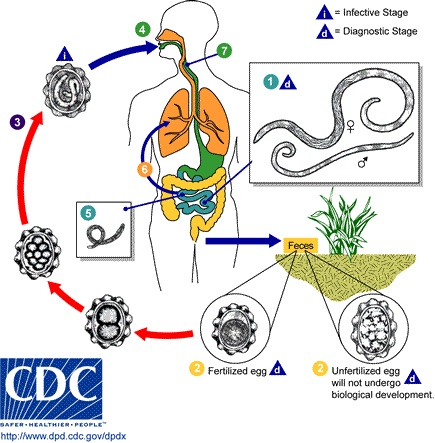Endoscopy parasite test can detect worms (colonoscopies too)
Endoscopies and colonoscopies can sometimes find parasitic worms like roundworms, tapeworms, or intestinal flukes.
But, sometimes even a severe parasitic worm infection will be missed by this test (I’ll explain why below)…worst of all, microscopic parasites will always be missed.
How Does An Endoscopy or Colonoscopy Detect Parasites
Coloscopies detect parasites by seeing them with a camera.
To visually see the insides of your intestines, a long flexible camera is guided into your intestines. This long camera can be passed through your mouth (endoscopy) or your rectum (colonoscopy)(1). At the end of this tube, there is a camera. This camera magnifies things up to 50 times their normal size – making it easier to detect intestine abnormalities like parasites. (2)
Can an endoscopy or colonoscopy find intestinal worms?
Overall, I’d give this test a D- for detecting parasitic worms.
These tests can detect parasitic worms or intestinal flukes, but it is often hit or miss. A colonoscopy can be inaccurate as much as 36% of the time when detecting colon cancer (2). Many parasites are much smaller than colon cancer or are completely invisible to the naked eye, so these can be even tougher to spot (even when the doctor is specifically looking for them).
In the best-case scenario, it is possible for the following parasites to be detected using endoscopy or colonoscopy:
- Roundworms
- Ascaris lumbricoides
- Hookworms
- Human whipworm
- Flukes
- Chinese liver fluke
- Human liver fluke
- Blood fluke
- Tapeworms
- Pork tapeworm
- Fish tapeworm
Why would these tests miss parasitic worm infections?
There are 2 reasons why an extremely skilled doctor can miss parasitic worms during this test. It comes down to the parasitic life cycle:
- All parasitic worms may be dead and missing from your intestines – but their nearly invisible eggs may still be present in your intestinal tract. The eggs will soon hatch and then begin the parasite’s life cycle. These eggs are microscopic, so they can’t be seen with the camera used in a colonoscopy or endoscopy (even when magnified 50 times). In this case, your parasitic worm infection will be missed.
- Parasitic worms spend part of their life cycle outside the intestines. The image below from the Centers for Disease Control and Prevention (CDC) shows the life cycle of the worm called Ascaris lumbricoides (3). You can see that that parasite spends part of its life cycle in your lungs. If your ascaris infection happens to be in your lungs when your doctor is doing the endoscopy, your doctor will miss it entirely.

What parasites will an endoscopy/colonoscopy miss 100% of the time?
Any parasites you’d need a microscope to see will always be missed with these tests.
Girardia, a common American parasite, measures 10 micrometers, or 0.00039 inches…which is 100 times smaller than the thickness of a penny, or 10 smaller than the thickness of paper. Because of how small some parasites are, it’s impossible for a doctor to confidently identify a tiny spec in your colon as Girardia (4).
Here is a list of common parasites that won’t ever be detected by a colonoscopy or an endoscopy:
- Protozoa
- Entamoeba histolytica
- Cryptosporidium
- Giardia lamblia
- Blastocystis hominis
So if Giardia lamblia is the cause of your diarrhea symptoms, it will never be detected by an endoscopy or a colonoscopy.
Overall effectiveness of these tests for finding parasites:
To summarize, here is what this parasite test can find:
- Can sometimes find parasitic worms
- Can rarely find intestinal flukes
- Cannot detect microscopic parasites
So based on the above facts, these are unreliable parasite tests that I would not recommend.
These might be good tests for detecting bowel or stomach cancer, but not for detecting parasites. There are much better parasite tests available that also don’t involve the risks of being sedated, bleeding, or having a perforated intestine if the tests don’t go well.
If you’re serious about getting an effective intestinal parasite test, then stick with the parasite stool test.
The benefits of a parasite stool test are:
- Detects parasitic worms
- Detects microscopic parasites
- Test can be administered at home
- It’s a safe test to take
References:
- Brady, C. E., 3rd, Stewart, D. L., DiPalma, J. A., Clement, D. J., Coleman, T. W., & Rugh, K. S. (1985). Upper gastrointestinal endoscopy–how far does the endoscope go?. Gastrointestinal endoscopy, 31(6), 367–369.
- Konishi K, et al. A comparison of magnifying and nonmagnifying colonoscopy for diagnosis of colorectal polyps: A prospective study.
- Centers for Disease Control and Prevention biology of Ascariasis.
- Centers for Disease Control and Prevention biology of Giardiasis.
